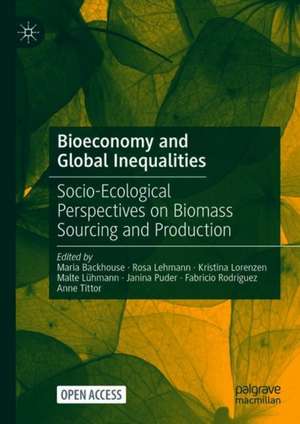Bioeconomy and Global Inequalities: Socio-Ecological Perspectives on Biomass Sourcing and Production
Editat de Maria Backhouse, Rosa Lehmann, Kristina Lorenzen, Malte Lühmann, Janina Puder, Fabricio Rodríguez, Anne Tittoren Limba Engleză Paperback – 18 mai 2021
| Toate formatele și edițiile | Preț | Express |
|---|---|---|
| Paperback (1) | 179.92 lei 22-36 zile | +23.96 lei 6-12 zile |
| Springer International Publishing – 18 mai 2021 | 179.92 lei 22-36 zile | +23.96 lei 6-12 zile |
| Hardback (1) | 428.07 lei 43-57 zile | |
| Springer International Publishing – 18 mai 2021 | 428.07 lei 43-57 zile |
Preț: 179.92 lei
Nou
Puncte Express: 270
Preț estimativ în valută:
34.43€ • 36.04$ • 28.65£
34.43€ • 36.04$ • 28.65£
Carte disponibilă
Livrare economică 10-24 martie
Livrare express 22-28 februarie pentru 33.95 lei
Preluare comenzi: 021 569.72.76
Specificații
ISBN-13: 9783030689469
ISBN-10: 3030689468
Pagini: 237
Ilustrații: XVI, 338 p. 13 illus. in color.
Dimensiuni: 148 x 210 x 24 mm
Greutate: 0.43 kg
Ediția:1st ed. 2021
Editura: Springer International Publishing
Colecția Palgrave Macmillan
Locul publicării:Cham, Switzerland
ISBN-10: 3030689468
Pagini: 237
Ilustrații: XVI, 338 p. 13 illus. in color.
Dimensiuni: 148 x 210 x 24 mm
Greutate: 0.43 kg
Ediția:1st ed. 2021
Editura: Springer International Publishing
Colecția Palgrave Macmillan
Locul publicării:Cham, Switzerland
Cuprins
1.Introduction. Contextualising the Bioeconomy in an Unequal World: Biomass Sourcing and Global Socio-ecological Inequalities; Maria Backhouse, Rosa Lehmann, Kristina Lorenzen, Janina Puder, Fabricio Rodríguez, Anne Tittor.- Part 1 Rethinking the Bioeconomy, Energy, and Value Production.- 2. Global Inequalities and Extractive Knowledge Production in the Bioeconomy;
Maria Backhouse.- 3. Neoliberal Bioeconomies? Co-constructing Markets and Natures; Kean Birch.- 4. Tools of Extraction or Means of Speculation? Making Sense of Patents in the Bioeconomy; Veit Braun.- 5. Bioenergy, Thermodynamics and Inequalities; Larry Lohmann.- Part 2 Bioeconomy Policies and Agendas in Different Countries.- 6. Knowledge, Research, and Germany’s Bioeconomy: Inclusion and Exclusion in Bioenergy Funding Policies; Rosa Lehmann.- 7. A Player Bigger than its Size. Finnish Bioeconomy and Forest Policy in the Era of Global Climate Politics; TeroToivanen.- 8. Sugar-Cane Bioelectricity in Brazil: Reinforcing the Meta-Discourses of Bioeconomy and Energy Transition; Selena Herrera, John Wilkinson.- Part 3 Reconfigurations and Continuities of Social-ecological Inequalities in Rural Areas.- 9. Buruh Siluman: The Making and Maintaining of Cheap and Disciplined Labour on Oil Palm Plantations in Indonesia; Hariati Sinaga.- 10. Superexploitation in Bio-based Industries. The Case of Oil Palm and Labour Migration in Malaysia; Janina Puder.- 11. Sugarcane Industry Expansion and Changing Rural Labour Regimes in Mato Grosso do Sul (2000–2016); Kristina Lorenzen.- 12. Territorial Changes around Biodiesel. A Case Study of North-western Argentina.- Virginia Toledo López.- Part 4 The Extractive Side of the Global Biomass Sourcing.- 13. Contested Resources and South-South Inequalities. What Sino-Brazilian Trade Means for the “Low-Carbon” Bioeconomy; Fabricio Rodríguez.- 14. Sustaining the European Bioeconomy. The Material Base and Extractive Relations of a Bio-based EU-Economy; Malte Lühmann.- 15. Towards an Extractivist Bioeconomy? The Risk of Deepening Agrarian Extractivism when Promoting Bioeconomy in Argentina; Anne Tittor.
Notă biografică
Maria Backhouse is Professor of Global Inequalities and Socio-ecological Change at the Institute of Sociology, Friedrich Schiller University Jena, Germany.
Rosa Lehmann is a political scientist and postdoctoral researcher at the Institute of Sociology, Friedrich Schiller University Jena, Germany.
Kristina Lorenzen is a Latin Americanist and researcher at the Institute of Sociology, Friedrich Schiller University Jena, Germany.
Malte Lühmann is a political scientist and researcher at the Institute of Sociology, Friedrich Schiller University Jena, Germany.
Janina Puder is a sociologist and researcher at the Institute of Sociology, Friedrich Schiller University Jena, Germany.
Fabricio Rodríguez is a political scientist and postdoctoral researcher at the Institute of Sociology, Friedrich Schiller University Jena, Germany.
Anne Tittor is a sociologist and postdoctoral researcher at the Institute of Sociology, Friedrich Schiller University Jena, Germany.
The editors are all members of the Junior Research Group “Bioeconomy and Inequalities. Transnational Entanglements and Interdependencies in the Bioenergy Sector” funded by the German Federal Ministry of Education and Research (BMBF).
Textul de pe ultima copertă
This open access book explores bioeconomy and bioenergy policies across South America, Asia and Europe. It discusses how a transition away from a fossil and towards a bio-based economic order alters, reinforces and challenges socio-ecological inequalities. A series of conceptual discussions and case studies with a multidisciplinary background in the social sciences illuminate how the deployment of biomass sources from the agricultural and forestry sectors affect societal changes concerning knowledge production, land and labour relations, political participation and international trade. How can a global perspective on socio-ecological inequalities contribute to a critical understanding of bioeconomy? Who participates in the negotiation of specific bioeconomy policies and who does not? To what extent does the bioeconomy affect existing socio-ecological inequalities in rural areas? What are the implications of the bioeconomy for existing relations of extraction and inequalities acrossregions? The volume is an invitation to reflect upon these questions and more, at a time when the need for an ecological and socially just transition away from a carbon intensive economy is becoming increasingly pressing.
The editors, Maria Backhouse, Rosa Lehmann, Kristina Lorenzen, Malte Lühmann, Janina Puder, Fabricio Rodríguez and Anne Tittor are all social scientists and members of the Junior Research Group “Bioeconomy and Inequalities. Transnational Entanglements and Interdependencies in the Bioenergy Sector” funded by the German Federal Ministry of Education and Research (BMBF).
The editors, Maria Backhouse, Rosa Lehmann, Kristina Lorenzen, Malte Lühmann, Janina Puder, Fabricio Rodríguez and Anne Tittor are all social scientists and members of the Junior Research Group “Bioeconomy and Inequalities. Transnational Entanglements and Interdependencies in the Bioenergy Sector” funded by the German Federal Ministry of Education and Research (BMBF).
Caracteristici
This book is open access, which means that you have free and unlimited access Explores implications of bioeconomy and bioenergy policies in South America, Asia and Europe Discusses how a transition towards a bio-based economy affects socio-ecological inequalities
